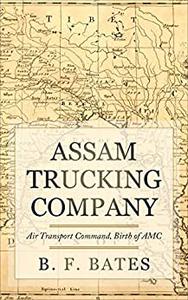
Assam Trucking Company: Air Transport Command, Birth of AMC by B. F. Bates
English | November 2, 2020 | ISBN: 1952064996 | 276 pages | EPUB | 1.62 Mb
Birth of the AMC, Air Mobility Command
Air Mobility Command was born out of the Air Transport Command or ATC, affectionately known as the Assam Trucking Company. This book explores the birth of U. S. military airlift capability through the role of the ATC in China-Burma-India, 1942-45. It is the story of "sky-born, long-haul trucking" over the lower spines of the Himalaya Mountains and dense Burmese jungles into primitive Chinese airfields behind enemy lines and the men who flew slow-moving, un-escorted, heavily-loaded transports over one of the most dangerous air routes in the world. Never in history had such an undertaking been conceived let alone attempted.
Assam Trucking Company tells the amazing story of how this airlift with no template as a reference literally "got off the ground," and became an effective model for tactical airlift of logistical supply that today is the Air Mobility Command, AMC.
B. F. Bates is one of the few with a link to the actual first hand accounts.
Flying the Hump
It was called "flying the hump." The pilots of the ATC did it every day from extreme altitudes required to clear the Hymalayas, ice, heavy thunderstorms, strong winds and fog, to the long stretches of impenetrable tropic jungles. Bates looks at the actual records revealing the many aircrafts and crews which were lost in accomplishing this crucial victory of WW2.
Every man interviewed for this record said the same thing. They were there to keep the Japanese from joining with the Germans and Italians to achieve world domination. The American soldiers of ATC were an important piece of saving the world.
Lasting Impact of the ATC
General Tunner, who as a Major in 1942 had been involved in the planning effort for the world-wide mission of Air Transport Command, took what he had learned and honed during the Hump operations and applied them to the Berlin Airlift.
The U.S. Air Force became its own military organization in 1947. ATC was redesignated as the Military Air Transport Services (MATS) and was given these responsibilities:airlift/ferrying operations,air communications,air weather service,aeromedical evacuation,photomapping and audio-visual services,air-sea rescue and recovery worldwide.Combat Cargo and Troop Carrier were reorganized under Tactical Airlift Command.
"Today's Air Force owes (much) to the legacy of men and women (ATC) who made great sacrifice and accomplished a herculean effort. ... Without the lessons learned from this endeavor, the Berlin Airlift may not have had the profound strategic effect that it did, an effort regarded as airpowers' most decisive Cold War contribution" (CMSgt Paul Wallace, USAF (Ret) KC-135 Boom Operator, AMC).
About the Author
B. F. Bates was born into the history of the ATC, listening to the stories of her father as he recounted his experiences flying the Hump. Growing up as an Air Force brat, Ms. Bates developed an understanding of the military and an appreciation for the sacrifices made by all the men and women who serve. With over thirty years of experience as an Instructional Designer for all military services except the US Coast Guard, Ms. Bates has developed training materials for five aircraft platforms and all of their aircrew members, as well as maintenance manuals.
She has a B.A. in History and English, and a Master's degree in Secondary Education. She also wrote, Texoma Medical Center: The First Twenty-Five Years. Ms. Bates lives in the Dallas suburbs with her son and family.
Links are Interchangeable - No Password - Single Extraction



